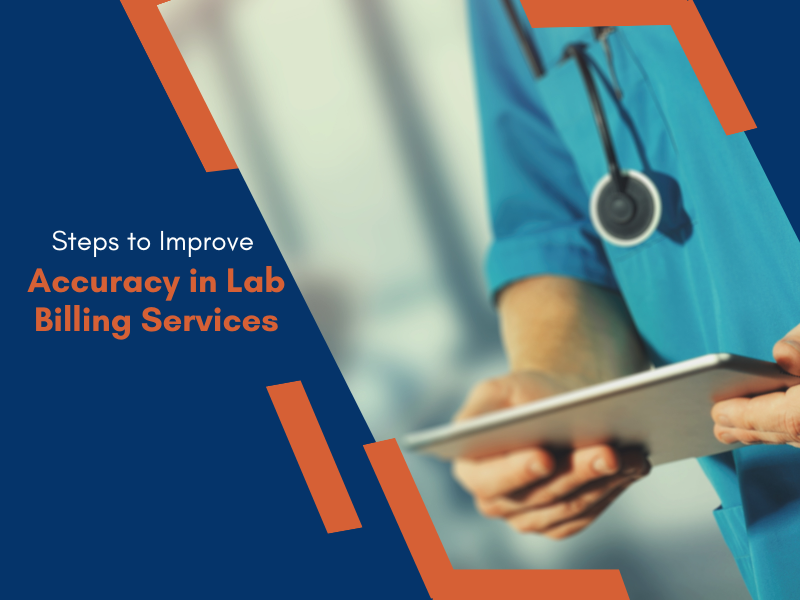In the fast-paced world of healthcare, laboratories are essential in providing precise diagnostic data that guides treatment. However, managing lab billing services with accuracy remains a complex task due to frequent regulatory changes, intricate billing codes, and the need for streamlined claims processing. Improving accuracy in lab billing services not only ensures timely reimbursements but also enhances overall operational efficiency and patient satisfaction. In this blog, we’ll explore actionable steps to improve accuracy in lab billing services to help laboratories achieve reliable financial performance and compliance.
1. Standardize Billing Processes and Procedures
Implementing a standardized process is foundational for achieving billing accuracy. Establishing clear guidelines for coding, billing, and claims submission can minimize errors from the start. Every lab should create a structured workflow with specific tasks, steps, and review points, ensuring that all team members understand their roles in the billing cycle. Documenting these processes in accessible guidelines can also help new staff members onboard quickly and consistently.
2. Invest in Advanced Lab Billing Software
Modern lab billing services demand robust software to handle billing complexities and high data volumes. Investing in advanced billing software that automates repetitive tasks, such as data entry and billing code assignment, can dramatically reduce errors. Additionally, these systems provide a centralized location for all billing records, making it easy to track payments, manage claims, and identify inconsistencies. Look for software that offers real-time error alerts, compliance tracking, and customizable reporting capabilities to ensure billing accuracy.
3. Conduct Regular Training for Billing Staff
Lab billing is a field that requires specialized knowledge, especially as billing codes, insurance requirements, and regulatory guidelines continually evolve. Training programs should be scheduled regularly to keep billing staff updated on the latest changes in billing codes, medical terminologies, and software updates. Consistent training minimizes costly errors, improves billing efficiency, and enhances staff confidence in handling complex billing cases.
4. Ensure Compliance with Regulatory Requirements
Compliance is essential in lab billing services, where non-adherence to regulations can lead to denied claims, penalties, or even legal consequences. Laboratories should stay informed about updates in CMS guidelines, HIPAA regulations, and payer-specific requirements. By regularly reviewing these compliance standards and incorporating them into the billing workflow, labs can prevent errors related to documentation, coding, and privacy issues. Working with compliance experts or external consultants can also help laboratories navigate complex regulations effectively.
5. Streamline Communication Between Departments
Effective communication between lab technicians, billing teams, and administrative staff is crucial for accurate billing. When results are processed, it’s important to communicate the required codes and details to the billing team to avoid miscommunication that can lead to inaccurate claims. Adopting a secure communication platform or integrating billing software with lab management systems ensures a seamless flow of information, reducing the risk of manual errors and billing inconsistencies.
6. Implement Pre-Billing Verification Checks
Performing pre-billing verification is a proactive measure to ensure billing accuracy. This step involves checking the patient’s insurance coverage, verifying eligibility, and confirming the required documentation before processing the billing. Pre-billing verification can significantly reduce rejections by identifying and addressing discrepancies early in the process. Moreover, it increases the likelihood of prompt reimbursements and minimizes the need for follow-up.
7. Monitor and Address Denied Claims Promptly
Denied claims are common in lab billing services, but many rejections stem from minor errors or missing information. Setting up a process to monitor denied claims closely and address them promptly can improve the billing cycle’s efficiency. Billing teams should categorize denial reasons, correct issues, and resubmit claims in a timely manner. By regularly analyzing denial trends, labs can identify recurring issues and adjust their processes to avoid similar denials in the future.
8. Utilize Proper Coding Techniques
Correct coding is the backbone of any accurate billing process. Laboratories should focus on coding accuracy by adopting proper coding techniques, ensuring the use of updated codes, and reviewing common coding mistakes. Investing in the training of staff or employing certified medical coders familiar with lab-specific codes, such as CPT and HCPCS, will reduce the risk of coding errors that lead to denials. Regularly updating codes based on industry standards further enhances billing accuracy and compliance.
9. Establish a System for Quality Control and Auditing
Quality control is an essential step to ensure ongoing billing accuracy. Establishing an internal auditing process that periodically reviews billing data, claims, and payments helps labs identify potential issues before they escalate. Quality control procedures can include random audits, monthly reviews, or daily spot-checks, depending on the lab’s capacity. Having a dedicated team or individual responsible for quality control ensures consistent oversight, helping labs maintain high accuracy levels in their billing services.
10. Optimize Patient Data Management
Effective patient data management is crucial in lab billing services. Inaccurate patient data, such as incorrect insurance details, can result in claim denials and delayed payments. Laboratories should implement thorough patient data verification protocols, especially during patient registration. This can include double-checking insurance information, personal details, and authorization requirements. Using a centralized database that securely stores and manages patient data reduces the risk of errors in billing.
11. Outsource Billing Services to a Reliable Provider
For labs that face challenges in managing billing complexities or staffing qualified personnel, outsourcing to a reliable billing provider can be a strategic solution. Third-party billing services bring specialized expertise, streamlined processes, and advanced technology to the table. They are equipped to handle tasks such as coding, claims submission, denial management, and compliance, ensuring high accuracy levels while allowing laboratory staff to focus on core functions. By partnering with a reliable provider, labs can optimize their billing performance and maintain compliance.
12. Monitor Key Performance Indicators (KPIs)
Tracking KPIs related to billing accuracy can provide insights into the lab’s billing performance. Metrics like claim acceptance rates, days in accounts receivable, and denial rates help identify areas that need improvement. Regularly monitoring these KPIs allows labs to set realistic goals, measure progress, and implement targeted changes where necessary. Reviewing and analyzing these metrics periodically also ensures that the lab stays on track with its billing accuracy goals.
13. Adopt a Patient-Centric Approach to Billing
Billing accuracy can also be enhanced by adopting a patient-centric approach, which involves educating patients on their financial responsibilities and maintaining transparent communication. Clear communication about costs, insurance coverage, and payment methods reduces the risk of billing disputes and improves patient satisfaction. Labs can implement online portals for patients to access billing information, track payment statuses, and resolve queries efficiently, fostering a seamless and positive billing experience.
Conclusion: Why Choose Apaana Healthcare for Accurate Lab Billing Services?
Improving accuracy in lab billing services is essential for laboratory success, and following these steps can help labs minimize errors, streamline processes, and ensure compliance. At Apaana Healthcare, we drive operational excellence with global healthcare management solutions tailored for laboratories and health plans. Our specialized services include member enrollment, claims administration, medical billing & coding, and provider engagement to support efficient, cost-effective operations. By partnering with Apaana Healthcare, you gain a reliable, outsourced solution that ensures billing accuracy, compliance, and a smoother revenue cycle.
Our team of experts and advanced technology deliver streamlined processes and top-notch service quality, allowing you to focus on providing outstanding laboratory services while we manage your billing needs. Choose Apaana Healthcare for a partnership that elevates your lab billing accuracy and optimizes financial performance.





